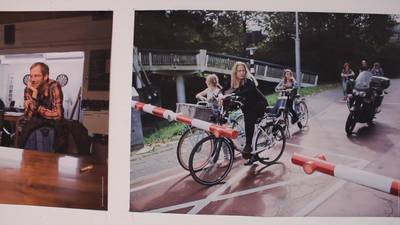This article examines how the human perception of knowledge is structured in the empirical world. It is often argued by scientists that facts in this empirical world can be perceived, which makes us believe that this world is an objective world. However, the human way of making sense of the world is individual and embodied, which causes the creation of an individual world for every human: a body-world. The empirical world is in this case a shared space for multiple bodies that agree on the causality of certain events and objects in that space. Every body-world therefore has its own partial perspective on the knowledge in this shared space, which is formed by the physiology of the body, the cultural background, and the identity of the person. The theater has the power, through the techniques of re-enactment and disruption, to give its audience insight in other situated knowledges from different partial perspectives. It can therefore connect different situated knowledges and create ecological knowledge: the awareness of the connected network of knowledges that is produced in various body-worlds on what is happening in the shared space. Only then can we emancipate knowledge and embrace the various partial perspectives that this shared space of body-worlds has to offer.
DOCUMENT
Met betrekking tot dat moment dat ik niet de waarheid sprak (hoewel ik het kon.) Het werk van beeldend kunstenaar en PhDArts onderzoeker Eleni Kamma bestaat uit twee delen: een portretserie die bekentenissen van onoprechtheid toont en onderzoeksmateriaal waarbij ze parrèsia of het vrijmoedig spreken onderzoekt.Op het Griekse eiland Tinos, waar Kamma een tijdelijke communale plek creëerde, nodigde zij mensen uit om momenten op te biechten waarop zij onoprecht waren. Een lokale fotograaf heeft hen geportretteerd op paspoortformaat, terwijl ze een moment van onoprechtheid herbeleefden en naspeelden. In haar rol als beeldend kunstenaar was het portretteren een manier om persoonlijke drijfveren te visualiseren en te testen of een theatrale activiteit, zoals een re-enactment of performance, een verzoenende functie kan vervullen en aan kan zetten tot delen en co-creatie.Afgelopen september in Groningen vroeg Kamma, ten behoeve van haar onderzoek, bijna het tegenovergestelde; ze nodigde mensen uit tot het beoefenen van parrèsia. Een Grieks begrip waarbij de spreker zo volledig en nauwkeurig mogelijk verslag doet van zijn of haar gedachten, zodat toehoorders precies in staat zijn te begrijpen wat de spreker denkt. Middels audio-opname van deze getuigenissen onderzoekt Kamma niet alleen de vrijheid van meningsuiting, maar ook de morele verplichting om de waarheid te spreken voor het algemeen welzijn, zelfs als dat ten koste gaat van eigenbelang.
LINK

A considerable amount of literature on peer coaching suggests that the professional development of teachers can be improved through experimentation, observation, reflection, the exchange of professional ideas, and shared problem-solving. Reciprocal peer coaching provides teachers with an opportunity to engage in such activities in an integrated form. Even though empirical evidence shows effects of peer coaching and teacher satisfaction about coaching, the actual individual professional development processes have not been studied extensively. This article offers a way to analyze and categorize the learning processes of teachers who take part in a reciprocal peer coaching trajectory by using the Interconnected Model of Teacher Professional Growth as an analytical tool. Learning is understood as a change in the teacher's cognition and/or behavior. The assumption underlying the Interconnected Model of Teacher Professional Growth is that change occurs in four distinct domains that encompass the teacher's professional world: the personal domain, the domain of practice, the domain of consequence and the external domain. Change in one domain does not always lead to change in another, but when changes over domains do occur, different change patterns can be described. Repeated multiple data collection methods were used to obtain a rich description of patterns of change of four experienced secondary school teachers. The data sources were: audiotapes of coaching conferences, audiotapes of semi-structured learning interviews by telephone, and digital diaries with teacher reports of learning experiences. Qualitative analysis of the three data sources resulted in two different types of patterns: including the external domain and not including the external domain. Patterns of change within a context of reciprocal peer coaching do not necessarily have to include reciprocal peer coaching activities. When, however, patterns do include the external reciprocal peer coaching domain, this is often part of a change process in which reactive activities in the domains of practice and consequence are involved as well. These patterns often demonstrate more complex processes of change.
DOCUMENT

Dit onderzoek richt zich op het ontwikkelen van principes voor duurzame ontsluiting van een uniek archief binnen de Nederlandse podiumkunstensector: het archief van de Nederlandse mime. Hierbij staan drie vragen centraal: 1) Hoe ontsluit je een archief dat betrekking heeft op belichaamde kennis en voortkomt uit een bij uitstek fysieke praktijk? 2) Hoe kunnen principes voor ontsluiting ontwikkeld worden in antwoord op actuele vragen van studenten, docenten, en het brede professionele nationale en internationale werkveld? 3) Welke innovatieve vormen van kenniscirculatie zijn geschikt om de potentie van het archief ook voor andere kennisgebieden, buiten de kunsten, zichtbaar te maken? Dit postdoconderzoek van ATD docent Marijn de Langen bouwt voort op haar recente proefschrift Mime denken: Nederlandse mime als manier van denken in en door de theaterpraktijk (Universiteit Utrecht, 2017). Het onderzoek brengt actuele vraagstukken met betrekking tot het archief vanuit de opleiding en het beroepsveld in kaart, inventariseert sterke voorbeelden en bestaande strategieën van archiefontsluiting binnen- en buiten de podiumkunsten en analyseert relevante theorievorming. Gedurende het onderzoeksproces worden, in samenwerking met studenten, docenten en vakbeoefenaars, een aantal testcases/pilots gecreëerd waarin geëxperimenteerd wordt met mogelijke principes van ontsluiting. Dit kan de vorm aannemen van bijvoorbeeld een digitale presentatie, artistiek onderzoek, re-enactment. Het onderzoek laat zien hoe urgentie gegeven kan worden aan een archief, en positioneert zich binnen een hedendaags discours in wetenschap en kunst rondom de ontwikkeling van methodologie om belichaamde kennis te expliciteren en te dissemineren. Het project legt hierdoor een concrete basis voor toekomstige multidisciplinaire samenwerkingsprojecten.